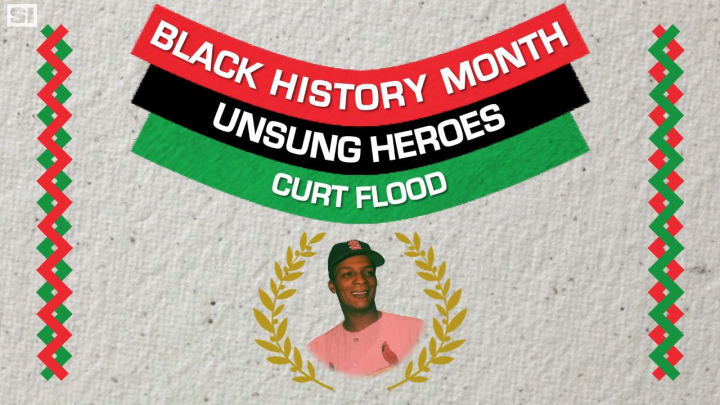Black History Month: Curt Flood Irrefutably Changed Baseball for the Better

This February, Sports Illustrated is celebrating Black History Month by spotlighting a different iconic athlete every day. Today, SI looks back on the legacy of Curt Flood.
Curt Flood was the best center fielder in the game for a good stretch of time. But that's not where his impact was most profound.
Flood helped usher in an era of player empowerment, one whose reverberating effects touch every aspect of professional sports today.
Before Flood, players could not move freely between teams. A century-old reserve clause bound players to a single team, subject to the whimsies of the management of said team. The league had been able to skirt antitrust laws since 1922, when Supreme Court justice Oliver Wendell Holmes ruled that MLB was allowed to act like a monopoly.
That, of course, kept salaries low and agency non-existent. Players were essentially the property of their owners. Flood, near the peak of his powers and with much to lose, worked to dismantle that system.
After 12 productive years with the Cardinals—in which he hit .293/.343/.390 and was the surest glove in center—he was traded to the Phillies as a part of an institutional fire sale in 1970. Flood refused to go.
"I do not feel that I am a piece of property to be bought and sold," he wrote in a famous letter to commissioner Bowie Kuhn.
He fought back against a regressive infrastructure, one that no other player had the gall to fight before.
Flood was due to make $100,000 in 1970, or more than $680,000 in today's dollars. In many ways, his dissent had to do with his disdain for Philadelphia and for his old bosses in St. Louis, who he felt treated him poorly and unfairly.
But ultimately, he knowingly gave up his future in MLB for his principles.
Several years of legal battles against the then-largest professional sports league in the United States ensued. Flood retained former Associate Justice of the Supreme Court Arthur Goldberg and the newly conceived MLB Player's Association fully backed him.
The trial started in May 1970. Flood was the plaintiff. The defendants were the commissioner of baseball, the presidents of every American and National League team and the chief executives of every team, too.
The case went all the way up to the Supreme Court, which upheld MLB's right to the reserve clause in 1972 by a margin of 5-3—citing Wendell Holmes's 1922 ruling as precedent.
But Flood's years-long push for liberty proved worthwhile. In 1976, a form of free agency was finally allowed in baseball. Other leagues soon followed suit.
More From Biography.com
• Florence Griffith Joyner
• Jackie Joyner-Kersee
• Wilma Rudolph
• Althea Gibson
Flood was railroaded in his pursuit for justice. He became a pariah throughout the game. He systemically received death threats from unsuspecting fans and was shunned by the baseball establishment.
Flood did return to MLB in 1971 in the midst of his ongoing legislation, but played just 13 games with the Washington Senators before leaving the game for good.
There's no Gerrit Cole to the Yankees, Bryce Harper to the Phillies or Anthony Rendon to the Angels without Flood. There's no LeBron to the Lakers or Heat. There's no Kevin Durant to the Warriors or Kawhi Leonard to the Clippers, either. His actions allowed for players to finally have agencies over their careers. And for that, his legacy lives on.
From the SI Vault:
"The Flood Case," by Robert Creamer (June 1, 1970)
"Not Just A Flood, But A Deluge," by William Leggett (August 19, 1968)
"Curt Flood Dies," by Tom Verducci (Jan. 27, 1997)
